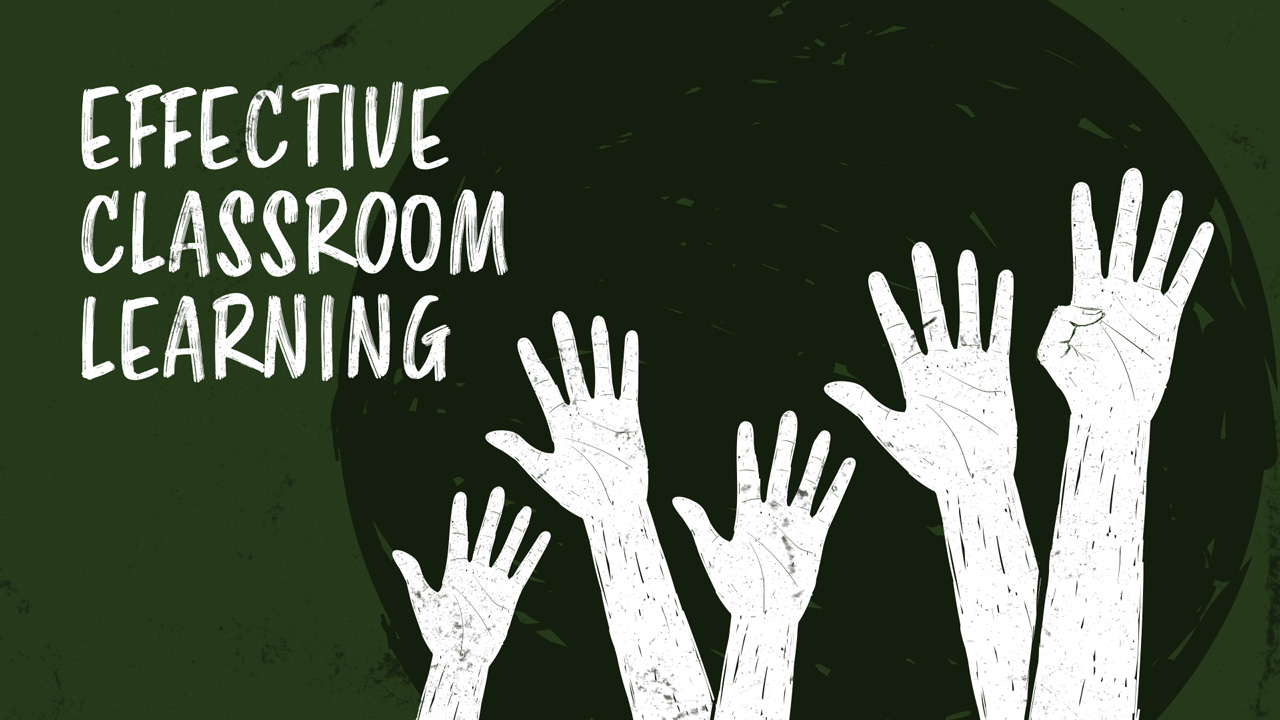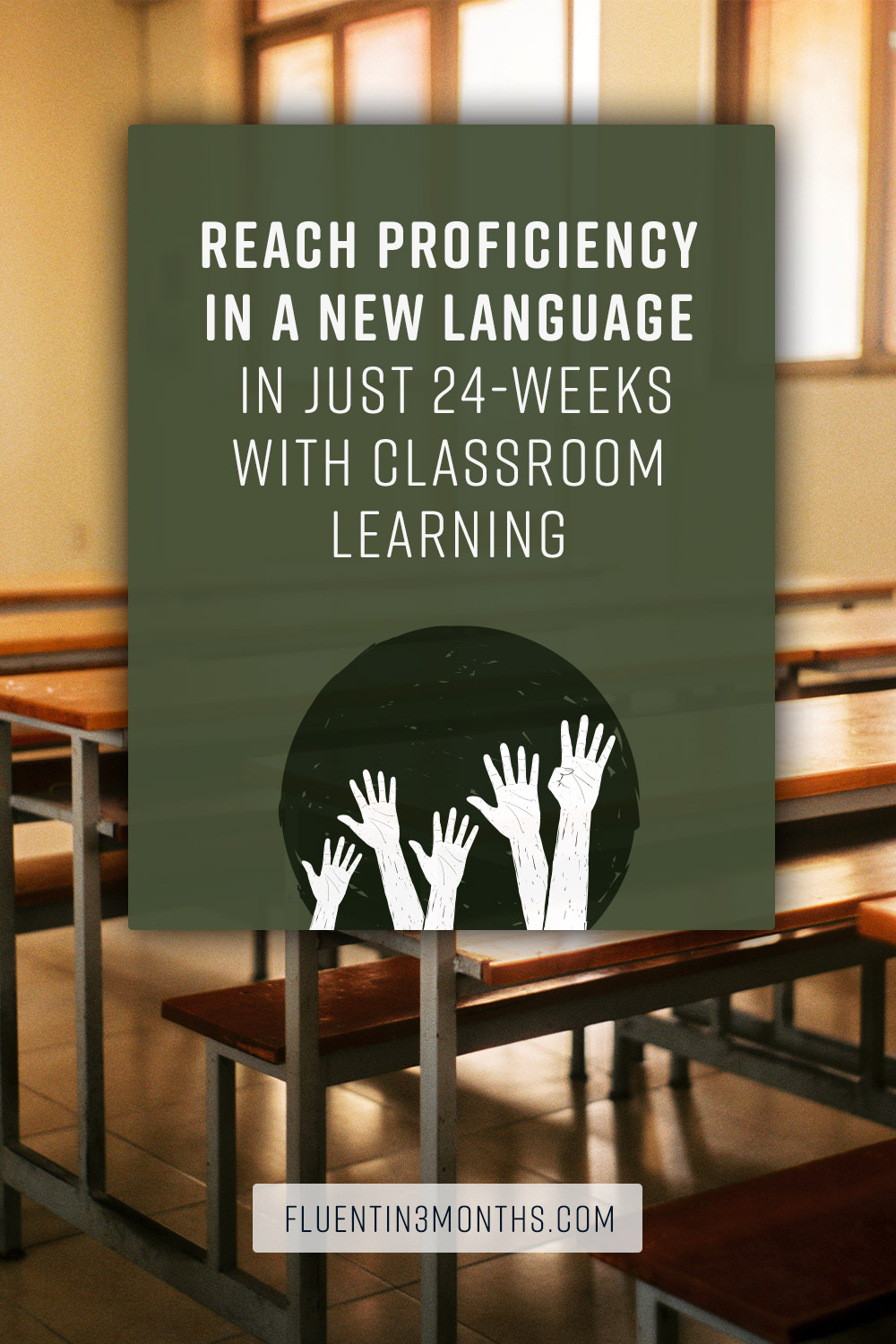You Can Reach Proficiency in a New Language in Just 24-Weeks with Classroom Learning
Stop me if this sounds familiar — “I took X language in high school and/or college but I didn’t really learn anything.”
If you feel like this, trust me you are not alone. There are thousands, if not millions, of people like you who took a language in high school or college but graduated feeling like they hadn’t really learned anything at all. Most people chalk this up to bad teaching or poor curriculum, and this is sometimes the case. However, the truth is that sometimes it was also due to the student.
Why Language Classes Can Mean Great Grades, but Poor Communication Ability
As someone who started teaching English fairly recently, I have learned some hard truths. The first is that teaching is hard. What is the best way to get what I know into the head of somebody else without overloading or boring them? This becomes even harder when you factor in the 15 other students in the classroom.
Most high schools and even some colleges are very limited in what they can do. They get the students for 45-90 minutes per day, sometimes even less. They also have to compete with all the other subjects and extracurriculars on their plate.
Even more difficult is the fact that foreign languages are not like history or math. Simply memorizing verb charts or prepositions will not take you to where you want to go. Sure, you may pass the class with an A+ but then you are back to the first sentence of this article. Great grades, poor communication ability.
But never fear! There are many ways you can use your language classes to help boost you into fluency even faster than if you studied on your own. Here are some reasons you aren’t learning in school and how to fix them.
To Speak a Language in Real Conversations, You Have to Put in the Work
First, if you think that this article contains some kind of magic formula where you can learn without putting in more work, you should look somewhere else. Unfortunately, this does not exist.
Your motivation for learning this language is very important. If you really don’t care about learning and only are interested in the benefits you may receive (a certain job, a travel opportunity, etc.) then you will have a hard time achieving a high level. And if you do, you are probably disciplined and motivated enough that you do not need this article. However, most of us are not that kind of person.
Intrinsic vs extrinsic motivation is a highly studied phenomenon. Fluent in 3 Months founder Benny talks in this article about being a lifelong learner. In short, people tend to put in more work when they are intrinsically motivated. If your end goal really is to learn this language for your future job, a simple change in mindset can make all the difference. Instead of thinking “I need to learn X language so I can have X job”, try “I want to learn X language as best I can so that I can be the best possible employee at X job”. Now the language is not simply a means to an end but an integral part in becoming a better person and employee.
Also, simply graduating with a degree in a language can look good on a resume, but what happens when you have to speak with Spanish-speaking clients when you only ever cared about getting an A?
45-Minutes Per Week is Not Enough
One of the biggest problems that I see in people trying to learn a language in a classroom (and I was guilty of this myself) is that they think those 45, 60, or 90 minutes is enough to get them to fluency. It’s almost definitely not.
Whether it’s a high school class, college lecture or private language school, learning in a classroom has its limitations. Most likely you will focus on grammar, reading, and writing. And this makes sense, as these are the things a teacher can grade easily. However, they are not the only aspects of language and something like 2-3 hours a week is not sufficient. If you really want to learn, you must do more.
This is not to say that classroom education is bad. In fact, it can be an incredibly powerful tool. One of the most difficult parts of studying a language independently is forcing yourself to do the boring parts. At school, you must do the readings, the writing, the grammar exercises, because if you don’t you will get a bad grade. The trick is augmenting what you do in class.
How to Do It
Instead of faking your way through the homework and daydreaming in class, take on mastering each new topic as a personal challenge. Take time, even if it’s only 15 minutes, out of your day to do extra studying. And no, this doesn’t mean opening up your notebook and staring at what you already wrote. I want you to use the internet, a native friend, or another resource to really broaden your knowledge of the topic.
Let’s say you just learned about preterite vs imperfect past tenses in Spanish. You can use tools like Learning Languages with Netflix and make a note every time you hear someone use the preterite or the imperfect. Pay special attention to where they use it. If it doesn’t make sense to you, consult your textbook or the internet. Look to truly understand what is happening.
If you did this with every grammar topic, how much better would your grammar be? Would you make the same silly, basic mistakes as your classmates? Even more, with a solid base in grammar, how many fewer mistakes would you make in your writing or speaking? To top it all off, I guarantee your grades will improve!
How to Complete Homework Assignments so They’re Actually Useful
This is connected to the previous section, but is important enough to merit its own. Look, most classes require homework. You have to do it anyway. So what I am suggesting is taking it seriously. And not the, “I need to focus on this so I can get it done as quickly as possible” kind of serious. I mean, “I need to focus on this so I can learn and understand the idea as best I can”.
However, there are many students who take their homework seriously and still do not learn as well as they could. If you are someone who already cares deeply about your homework, you are halfway there. The next, equally important step is reviewing your teacher’s feedback with the same level of attention.
Mistakes are the single most important part of learning a new language. They are the best teachers and the fastest way of integrating a language into our minds. Imagine you are in a maze and you run down every corridor until you find the way out. This is much faster than spending hours deliberating on the right path. Mistakes also show us the problems with our way of thinking and open us to new possibilities.
So, treat your homework like it's a roadmap to fluency, but treat your mistakes like directions.
You Dislike your Teacher and/or Their Methods
Picture this: you just started a new semester and you are really excited about your Spanish class. You walk into the classroom and realize you got the worst teacher in the whole school. Great.
Unfortunately, most students experience this problem at some point in their academic careers. Whether it’s the way they run the class, their teaching style or simply their personality, they simply rub you the wrong way. Many times there’s nothing you can do, but the absolute worst possibility is letting the teacher get in the way of learning. Here are a couple ideas to improve your situation:
- There are teachers who are simply bad at teaching. If you have one of these, you may have to get creative. Luckily, the internet is an incredible resource. There are so many websites, online lectures, informational videos and blogs like this one that can help you out. What’s more, you don’t have to build your own curriculum. Just follow what the class is doing!
- This person chose to teach a language because they love that language and enjoy teaching it. If you express serious interest, they are generally more than willing to help you along and their attitude about you will most likely change. Trust me, as a teacher it is awesome to see students with real drive.
- Something students are hesitant to do is talk to their teachers. If there is something you don’t like about the class, please let the instructor know! As a teacher, I want my students to feel comfortable and enjoy my class. However, if nobody tells me about an issue they have, how can I solve it? This will work more often than you think.
- If you are really in a bad situation, try and change classes. If you make this request early enough in the semester and the scheduling fits, many colleges are more than happy to oblige. Doing this in high school can be a bit trickier but if you are persistent you can make it work.
- If all else fails, please realize that this is one semester. Do your best to learn what you can on your own and look forward to when you no longer have to deal with this person. Language learning takes a long time. When you are fluent, you will look back and laugh.
One Final Tip
The most important thing to keep in mind as a high school/college language learner is perspective.
Especially for those in high school, time is on your side. If you start learning Spanish in your freshman year of high school and continue on in college, that is potentially eight years of language instruction. Eight years. Imagine if you took 15 extra minutes out of your day (beyond doing required schoolwork) and focused on practicing. Taking out weekends and two months in the summer, that amounts to 400 hours over the course of eight years. 400 extra hours, in addition to the countless hours spent in the classroom, doing homework, and studying for tests.
To get some perspective, the US government gives an estimate about how many classroom hours it takes to achieve proficiency in a language. You can find that list here. Using Spanish as an example, the US Foreign Service estimates it will take around 24 weeks of classroom instruction to achieve proficiency. That is roughly one semester.
Using the techniques and advice in this article, you will be able to learn a language at that rate or even faster. Focus, don’t give up, and I know you can do it!




Social